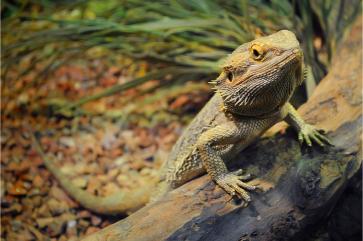Blog
Hot Weather Tips for Reptiles and Amphibians

Every individual, regardless of species, has their own preferred optimum temperature range (POTR). For pet reptiles and amphibians, achieving their POTR is essential to their physical and mental well-being. Without the ability to generate their own heat, these exotic pets rely on external heat sources. It makes sense then to think that reptiles and amphibians would enjoy some time in the summer heat. It’s a great opportunity, but allowing an exotic pet to experience the full splendor of the season should be done under caution and constant supervision.
Cold-Blooded Pets
When reptiles and amphibians are not comfortable in their environment, their appetite and metabolism change, and their immune systems may even start to falter.
While every reptile and amphibian has unique needs and preferences, the ambient temperature should be about 70 degrees. Providing a hot spot inside their habitat is essential, and should reach upwards of 100 degrees for optimum results. Additionally, adequate ventilation and shady hiding places are key to their health. For some amphibians that enjoy bathing in cooler water, be sure to have temperature gauges that monitor their pond.
Avoiding Extremes
Reptiles and amphibians can be incredibly sensitive to temperature extremes. Many reptiles have evolved to withstand high, dry heat, but that doesn’t mean they will not be affected by sudden exposure.
If the spot inside the home is too warm and/or sunny for a pet reptile or amphibian, be sure to relocate them to a cooler corner until the cooler temperatures of fall and winter arrive. Watch thermometers carefully, and adjust as needed. Likewise, the high, dry heat may require changes to humidity pet reptiles that need 70-80% humidity in their habitat.
Hot Weather for Reptiles and Amphibians
The summer months may have an impact on an exotic pet’s hydration minimums. Be sure there is always fresh, clean water for them, and keep an eye on the cleanliness of an amphibian’s tank. Filtering out the water on a regular basis throughout the summer months is critical to their health and hygiene. Add extra water to their diet by spritzing their crunchy produce with clean water.
If You Go Outside
Reptiles and amphibians can expand their horizons by going outside but only when:
- There are secure borders around where they will be (this may include a top panel to thwart bird attacks)
- The temperatures are manageable, ideally in the morning and evening not during the hottest time of the day
- There is access to water and hiding places
- Sessions are frequent but short
Lastly, please be aware of some of the most critical signs of heatstroke and other related illnesses, including:
- Panting or rapid breathing
- Listlessness
- Uncharacteristic behavior
- Fewer droppings than normal
If you have further questions about the safety of a pet reptile or amphibian this summer, please reach out to us at (210) 696-1700. Our staff is always here to help your exotic pet at Ten West Bird and Animal Hospital.
